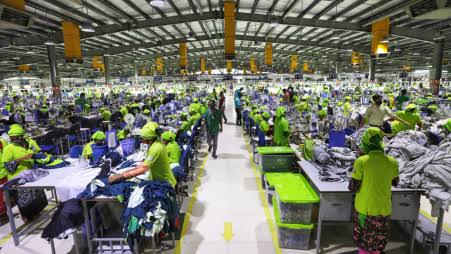Staff Correspondent
Published:2023-12-12 06:59:33 BdST
Labour conditions in RMG sector won’t warrant any sanctions: Apparel leaders
The country's apparel sector leaders have said that labour conditions in the country's ready-made garment sector are not in such a situation that would trigger any potential economic or trade sanctions.
Noting that if the US were to impose any sanctions, it would likely be due to political reasons rather than labour issues, they suggested that the government should diplomatically address such a situation, should they arise.
"There is no such situation in the country's RMG sector to warrant economic sanctions by the US," said Mohammad Hatem, executive president of the Bangladesh Knitwear Manufacturers and Exporters Association (BKMEA), while speaking at a seminar on Monday.
Economic Reporters' Forum (ERF) organised the seminar on "The Current Labour Issues and International Trade Scenario" at its office in Dhaka city.
On November 16, US President Joe Biden signed a memorandum focused on advancing workers' empowerment, rights, and maintaining high labour standards globally.
Elaborating on the memorandum, US Secretary of State Antony Blinken warned that sanctions, trade embargoes and visa bans would be imposed on those who threaten, intimidate, or attack labour-union leaders, labour-rights activists and labour organisations.
Hatem said that Bangladesh's apparel industry might lag behind compared to international standards, but it fares much better than China and other manufacturing countries in terms of RMG labour conditions.
"Despite that, if any sanctions are imposed, they would be due to political reasons, or due to the fact that they (US) have their own interests," he emphasised.
Speaking about the latest amendment to the labour law that the President did not sign, he said both the owners and worker representatives agreed to remove the condition required for the trade union registration threshold. This threshold is fixed at 15 per cent for factories with more than 3,000 workers and 20 per cent for units with fewer than 3000 workers.
Echoing Hatem, BKMEA Vice President Fazlee Ehsan Shamim described the situation as political and urged the government to tackle it diplomatically.
"If there is anything behind the scenes, it is up to the government to take the necessary measures about this," he stated.
Both the leaders expressed their concerns about potential sanctions but clarified that they are not overly worried.
National Garment Workers Federation President Amirul Haque Amin acknowledged that there are still some labour rights issues, such as unfair labour practices, low wages, challenges in trade union registration and compensation concerns. However, these issues are not severe enough in the country to justify the imposition of sanctions.
Questioning the ratification of ILO conventions by those advocating sanctions, he said that Bangladesh has ratified eight ILO core conventions, while the US signed only two, excluding those related to the right to organise and the right to bargaining.
Economist Mostafa Abid Khan, a member of the Bangladesh Trade and Tariff Commission, said, "According to the US memorandum, the likelihood of trade sanctions is low, as WTO regulations make it difficult."
While the chance of increasing tariffs is slim, individual penalties could be a possibility, he noted, advising a proactive approach rather than a reactive stance to the situation.
Unauthorized use or reproduction of The Finance Today content for commercial purposes is strictly prohibited.


